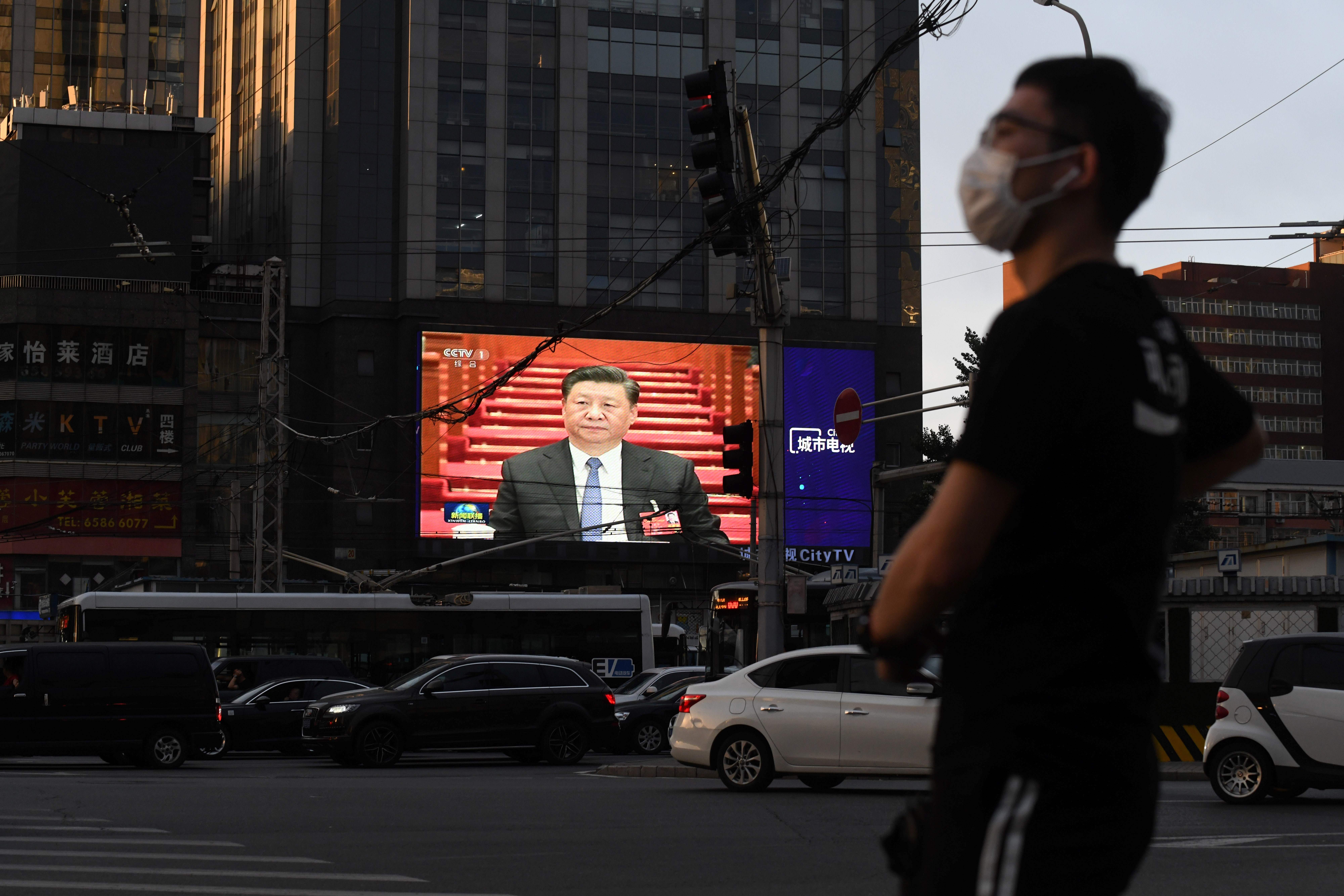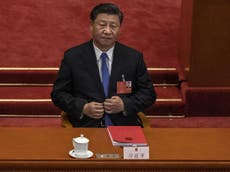Coronavirus is China’s chance to wage a data war on its own people
When the virus first appeared in Wuhan, it gave China an excuse to harvest data on all of its citizens, paving the treacherous path to becoming the first AI superpower, reports Brian McGleenon


For Xi Jinping, every cloud has a silver lining, even the deadly pathogen that crept out of Wuhan in December 2019, which provided the Chinese president with an opportunity to conduct an uncompromising data harvest on his people. Plans are under way to have every Chinese citizen digitally integrated into a centralised platform, accelerating Xi’s desire for AI supremacy and fully automated social control.
In late May, while most of the world was in lockdown, China announced zero new infections for the first time since the outbreak of the pandemic. It also announced a new centralised digital platform, Health Code, the sole purpose of which was an unparalleled scale of data collection and storage… as well as other ominous applications. According to the Chinese government’s website, the rationale behind the National Unified Government Services Platform is to integrate into one place “public security, human resources, and social security, education, health and civil affairs”.
To feed this centralised system with data fit for the nation’s authoritarian AI revolution, the politburo has ordered myriad coronavirus contact and tracing apps to become compatible with it. Drawing the intimate data hauled from these apps into something rather more potent, Health Code aims to make every Chinese citizen transparent to the state, rather than the other way around. As Chris Meserole, director of research and policy at the Brookings Artificial Intelligence and Emerging Technology Initiative, tells me: “Beijing is trying to create a taxonomy that sits on top of the Health Code apps in the hopes that the data will become interoperable over time.”
China has long been obsessed with internal stability and craves more accurate ways to predict how its population of 1.4 billion will react to policy changes. At the State Council’s New Generation Artificial Intelligence Development Plan announcement in 2017, President Xi said: “Artificial Intelligence will timely grasp the cognition and psychological changes of the masses, and take the initiative to make decisions.” To this, Meserole says the goal of the regime “is not merely to create a digital surveillance infrastructure, but to leverage that infrastructure to the point where surveillance is no longer needed, because the population already thinks and behaves in accord with CCP doctrine. The data Beijing is harvesting is ultimately directed toward that end.”
The Covid-19 pandemic has tested red lines on state intrusion into the private lives of its citizens. We are all becoming conditioned to accept restrictions on our civil liberties enacted through emergency legislation. Government-sanctioned contact and tracing apps are being granted unprecedented rights to personal information, such as 24-hour GPS location data and the ability to communicate with other users’ phones via Bluetooth. However, the Chinese version of these contact and tracing apps, the Health Code system, is very different from its counterparts in other countries. Chinese authorities have seen an opportunity they are keen to exploit. The apps are being adapted for long-term use and steps are already being taken to allow them to exceed the current parameters of just assessing a person’s Covid-19 risk.
In the city of Hangzhou, where pre-pandemic surveillance systems were already ubiquitous, the next stage of the contact and tracing app health officials plan to roll out includes seizing phone data to detect alcohol intake, tobacco use, amount of exercise, and how many hours slept. Health insurance firms are salivating. Even before the pandemic, movement around this tech hub was already buzzing. It is home to some of China’s biggest players in the surveillance sector, such as CCTV producer Hikvision. Traversing this city of 10 million inhabitants requires constant use of government-issued ID cards (necessary for public transport), buying mobile sims, obtaining a social media account, and even buying groceries.
Chinese AI company Megvii plans to mount multimodal sensors in public places that detect body temperature and carry out face recognition, dual-sensing via infrared cameras, iris recognition and cloud-based speech synthesis, all under the guise of anti-epidemic infrastructure. But observers predict that the powerful devices are in fact being prepared for a much darker purpose. Chris Balding, associate professor at the Fulbright University of Vietnam, said at the Rise of Digital Authoritarianism conference in October: “We recently discovered a database that was run by local government in China and it was truly staggering the level of detail that was in it. In addition to facial recognition it was covering such details as the fact the individual was wearing a scarf, how long the scarf was, what colour the scarf was, and what pattern was on the scarf. Once you see the level of detail and the mass amount of data that China is collecting, not just on their citizens at home but also on foreign individuals and companies around the world it puts the danger in a staggering new light.”
For the vast majority of Chinese citizens, the argument against the state’s dismantling of civil liberties and draconian data governance falter when presented with the stark contrast in death rates between the US and China. The US has surpassed 250,000 deaths, whereas for the whole of China the total number of fatalities is only 4,634. In mid-October, while the rest of the globe was cooped up in coronavirus confinement, China’s population enjoyed the Golden Week celebrations with pre-pandemic abandon. And, since the holiday period, there has been no rise in the reproduction rate of the virus. Xi’s methods have won domestic hearts and minds. Netizens on China’s microblogging website Weibo have praised “comrade Xi’s” tireless effort to win the “battle against the pathogen”. One posted: “Papa Xi has saved China from becoming chaotic, dysfunctional and ridden with gun violence like the US.” Another post stated: “Look how terrible they are at controlling coronavirus in other countries.” While pro-Beijing Chinese media group the Qiao Collective said: “Xi Jinping’s guidance has allowed 618 million people to travel during the eight-day national holiday, demonstrating post-pandemic recovery and a huge growth in domestic consumption.” State media has encouraged a militant lexis when referring to the nation’s struggle against coronavirus.
One illustration of this is the heroic portrayal of a police officer called Comrade Wu Xinyan. In a statement released by Hangzhou’s police department, Comrade Wu is said to have been inspired by President Xi to “maintain normal order and control of society in the main battlefield of the East Railway Station in Hangzhou”. Behind the domestic approval, the Chinese president, who has recently made himself the head of 11 major positions in central government, including the police and army, has used the unprecedented circumstances of the pandemic to sharpen a monolithic surveillance state. Sharpened to a point beyond any hope of repeal. Of this “new normal”, Meserole says: “There was already a trend toward greater government control of personal data prior to the coronavirus pandemic, and the crisis has only accelerated it. The special measures put in place have further normalised state surveillance and data collection, to the point where it will be difficult for the new norms to be rolled back.”
The Health Code system of coronavirus data collection has been integrated into the country’s most popular apps, Alipay and WeChat. Citizens must present a code on the app to access basic freedoms in China. Green means low risk and free to move around. Amber means at risk and the individual must quarantine for seven days. Red means high risk and the person must quarantine for 14 days. It is mandatory to scan the QR code on the app before entering public places such as subway stations and shopping malls, and in some cities citizens must scan the QR code before leaving apartment complexes. Access to the basics of life is denied and the authorities are alerted if an individual who is required to quarantine in accordance with their QR health code is attempting to venture outside. The app collects a lot of personal information from the first install: users must enter their name, identity card number and a facial scan and complete a detailed questionnaire setting out their medical and travel history.
The Health Code bio-surveillance mechanism is evolving fast and could become the template with which the CCP can realise their long-piloted Social Credits System (SCS). In the words of Xi Jinping, with SCS citizens will be coerced to “turn the knife inward” to “scrape poison off the bone”. Glenn Tiffert, a research fellow for the China’s Global Sharp Power Project at the Hoover Institution, describes how “the Chinese Communist Party has proved time and again that it cannot abide knowledge and people beyond its control and AI gives it unprecedented tools to indulge its impulse to dominate both”. The real-time measuring of a citizen’s health could then be adapted to measure social reputation, or “social credit”, as well. The algorithm could find that a person is infected with a different type of virus; that of disloyalty. Director of the SOAS China Institute professor Steve Tsang says the social credits system would control a citizen’s rights to roam freely throughout the country, just as their Health Code status currently does. He adds: “Trustworthy citizens will be allowed to roam everywhere, but discredited citizens will be barred from taking a single step.”
Another advancement is the integration of the country’s DNA database into the National Unified Government Services Platform. So far the DNA of nearly 10 per cent of the 700 million men in China have been collected. The country is also trialling a “newborn gene bank”, where the DNA of every newborn baby will be taken and stored centrally. According to The People’s Hubei newspaper, the DNA database has been set up to “comprehensively improve public security organs’ ability to manage and control society”. The genomic database is by far the world’s largest. Paternal genetic family trees are being collected to improve the government’s Sharp Eyes project, especially in rural areas where DNA samples can be collected without the public scrutiny that might occur among more informed city dwellers. Government scientists, accompanied by village cadres, have added the genetic map of whole rural regions to the database. The project name comes from the Cultural Revolution era slogan, “the people have sharp eyes”, which was a warning against the temptation to indulge in a ideologically disloyal act. Much of the focus of the Sharp Eyes project is aimed at identifying unofficial religious groups.
The project aims to create a net of surveillance cameras and DNA collections across the entire countryside, with the CCP's State Council stating it will have “coverage across all regions, sharing across all networks, availability at all times, and controllability at all points”, adding that it will be used to “promote the application of artificial intelligence in evidence collection”. This huge DNA database, combined with the health information of the individuals profiled, would make it one of the most valuable tools for genetic research in the world. Ping An Securities’ appraisal of China’s DNA database market placed it at over $1.4bn, setting up the world’s bio-engineering firms for a feverish competition for access.
The pandemic has seen a pivot of world financial power to Asia, particularly to China. President Xi is currently basking in the glory of China’s post-lockdown economic recovery. The nation’s economy is expected to be worth $14.6 trillion by the end of 2020, equivalent to a staggering 17.5 per cent of global GDP. Meanwhile, the economic forecast for the west is bleak. This is a huge blow to the morale of western democracies, and one that China is willing to exploit with an indirect attack on liberal political systems. Professor Tsang says: “Xi Jinping was in trouble at the beginning of the pandemic, when people were referring to it as China’s Chernobyl. But since his measures of control have been successful all of that original ferment is now a distant memory.” His approval rating has never been higher and although the level of social governance and personal intrusive is unrivalled, the vast majority of people in China accept the trade-off. Professor Tsang adds: “For the Chinese people this trade-off is a pragmatic choice and when they see the rest of the world still embroiled in lockdown, it is not an unreasonable one.” Meanwhile, Meserole says: “Even before the pandemic the government was often viewed as more trustworthy than the private sector when it came to data collection. So long as the pandemic remains under control and the economy remains strong, it’s hard to see that changing, even despite documented leaks of the Heath Code data.”
President Xi has used the coronavirus pandemic to tighten his grip on power, recentralising the hierarchy of authority with himself at the core. The pandemic, and especially Xi’s success at containing it, has created a new paradigm that normalises state intrusion into people’s lives. This will have a lasting coercive effect on the Chinese psyche. The nation is on an irresistible trajectory to create a truly omnipresent and automated surveillance state. But below the current nationalist elation that is facilitating this authoritarian-AI transformation a wave of unease is beginning to register. As Professor Tsang explains: “The CCP has a habit of taking things too far.” When one netizen in Hangzhou found out about the expansion of the Health Code app, they described a feeling of “living under a microscope, and it’s terrifying”. Another anonymously posted: “We have no privacy left, we are being led on a leash by the CCP.”




Join our commenting forum
Join thought-provoking conversations, follow other Independent readers and see their replies
Comments